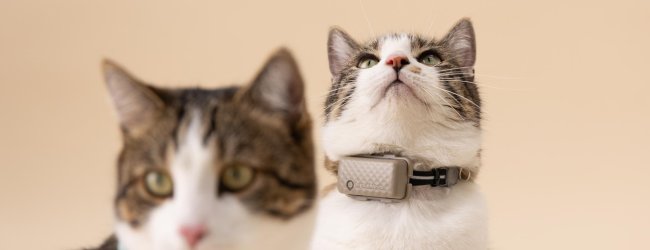 Approved by Dr. Dwight Alleyne, DVM
Approved by Dr. Dwight Alleyne, DVM How To Get Your Dog To Sleep Through The Night
Your dog might be tossing & turning for a whole bunch of reasons. Here's what you can do - and why tracking their sleep cycles matters.
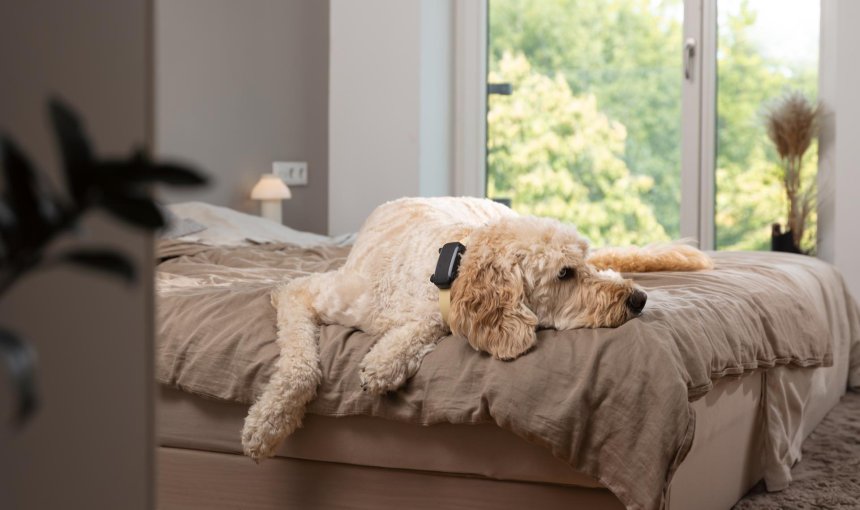
Just like humans, our furry friends need a good night’s rest. But if you’ve found yourself waking up to hear them tossing and turning, you might’ve wondered – how to get your dog to sleep through the night? And why is my dog’s sleep getting disturbed so often? Here are some ways, plus how tracking your dog’s sleep can help you spot health issues early.
Key Takeaways
Common causes for a dog waking up multiple times at night range from growing up, a lack of exercise, needing a different sleeping environment, to sickness and even pain.
You can help your dog to sleep through the night by following a consistent routine, ensuring they’ve gotten enough exercise, have a comfortable sleeping space, and have gone to the toilet before sleeptime.
The Tractive smart dog tracker with Health Monitoring helps you keep an eye on your dog’s sleep patterns, activity levels, and even vital signs – so you can catch on to potential health issues before they disrupt their rest.

Always know your buddy is healthy & safe
Read moreWhy is my dog waking up so much throughout the night?
Adult dogs naturally sleep 12-18 hours during each 24-hour period. But a dog that is restless or awake most of the night is sending you a message. They could be:
- Just growing up
Puppies only tend to sleep through the night once they’re 4 months and older, sleeping in fits and bursts until then. - In need of more exercise
Especially if you haven’t been at home and they’ve been dozing all day. - Lonely
Like if they’ve spent most of their day alone and now want to hang out with you. - Lacking proper bedding
Which makes a comfortable dog bed a must. - Too hot or too cold,
- Adjusting to a new environment
Which can feel disorienting at first. (Like a new apartment.) - Needing to go to the toilet
So you can let them outside to relieve themselves. - Struggling with bad dreams,
- Just getting older
Senior dogs are more at risk for cognitive decline – which usually turns up as a change in their sleep cycles. - Sick or in pain
Like from joint pain stemming from arthritis or even problems like anxiety. Watch out if your dog paces, whines, pants, or licks or bites their body in a harmful way. It could be that they have a medical issue that disrupts their sleep.
💡A smart tracker for dogs with Health Monitoring can be a lifesaver if you’re wondering how to get your dog to sleep through the night. It can help you figure out how much quality sleep your dog’s getting, any sleep disturbances – and how to catch on to a potential health issue before it has a chance to worsen.
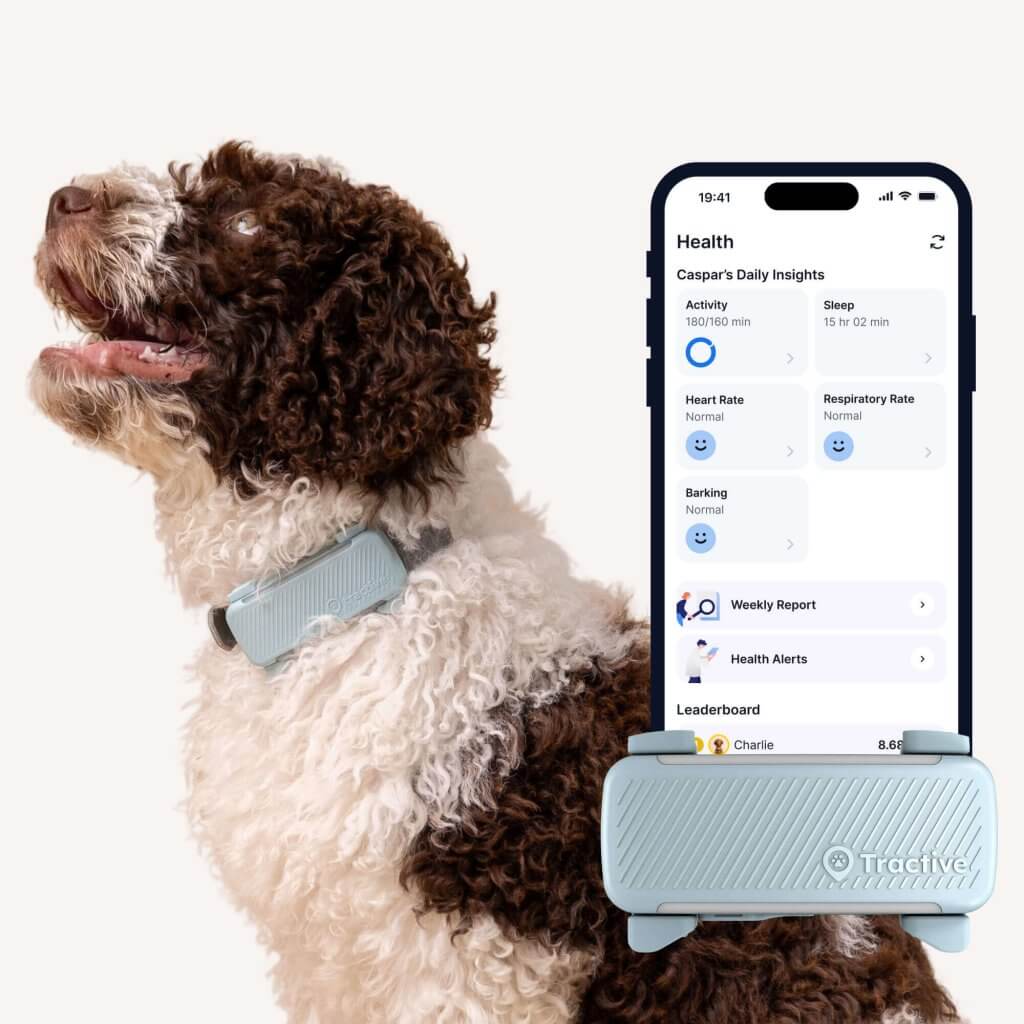
Get health alerts for your dog
Our pups can’t always tell us if something’s wrong. But if their tracker detects unusual changes in their routine, you’ll get an alert, helping you catch potential issues early.
How to get your dog to sleep through the night
1) Make sure your dog’s gotten their workout in
Take several walks during the day or engage in vigorous play. A long evening walk, for example, can both get your dog enough exercise and wind down before bedtime. Else, try these fun indoor games for dogs if you can’t head outdoors.
Likewise, a puzzle feeder can help keep your dog mentally stimulated during the day. These devices require your dog to do a little bit of mental “work” to retrieve their dog food or dog treats. Your dog might need to tap a button or dig for their food, which makes eating an interactive rather than passive experience, as well as more time-consuming. Do some research or talk to your veterinarian and choose a puzzle feeder that’s right for your dog’s size and personality.
Finally, a daily dog training session to work on basic commands like “sit” and “stay” can provide physical and mental stimulation. This is also good bonding time for you and your furry friend.
2) Use chew toys
Licking and chewing on something can help your dog release stress and relax. Tap into this natural tendency by giving your dog a favorite chew toy before bedtime to help calm them. Coat the chew toy with a little peanut butter to make the chew toy into a tasty bedtime treat. Consider placing the peanut butter-covered chew toy near your dog’s bed as you settle in for the night. Even the most reluctant pup will follow that treat straight into the dog bed!
3) Check for fleas or any other medical problem
If your dog seems restless and avoids laying down, it may be time for a visit to the veterinarian’s office. Does your dog have fleas that cause itching and discomfort? Or are there other medical issues, such as arthritis? Your vet can help to rule out serious health issues and recommend treatments.
4) Create a special, comfy sleeping area
You might want your pup to sleep beside you in your bed, but this almost guarantees that both of you will wake up during the night. A soft comforter or blanket folded in the corner of the room may be just what your pup needs for a restful sleep. Or, you can splurge on a fleece-lined memory foam bed for the ultimate doggie luxury.
Your dog’s sleeping location matters, too. Is the room quiet, or are there pinging electronics nearby that could wake up your pup? Trains, traffic, sirens, or anything that could wake you up might also wake your dog. Try playing calming music or white noise to block out unwanted sounds that could disturb your pup’s sleep. (Dogs tend to calm down best when listening to soft rock or reggae.)
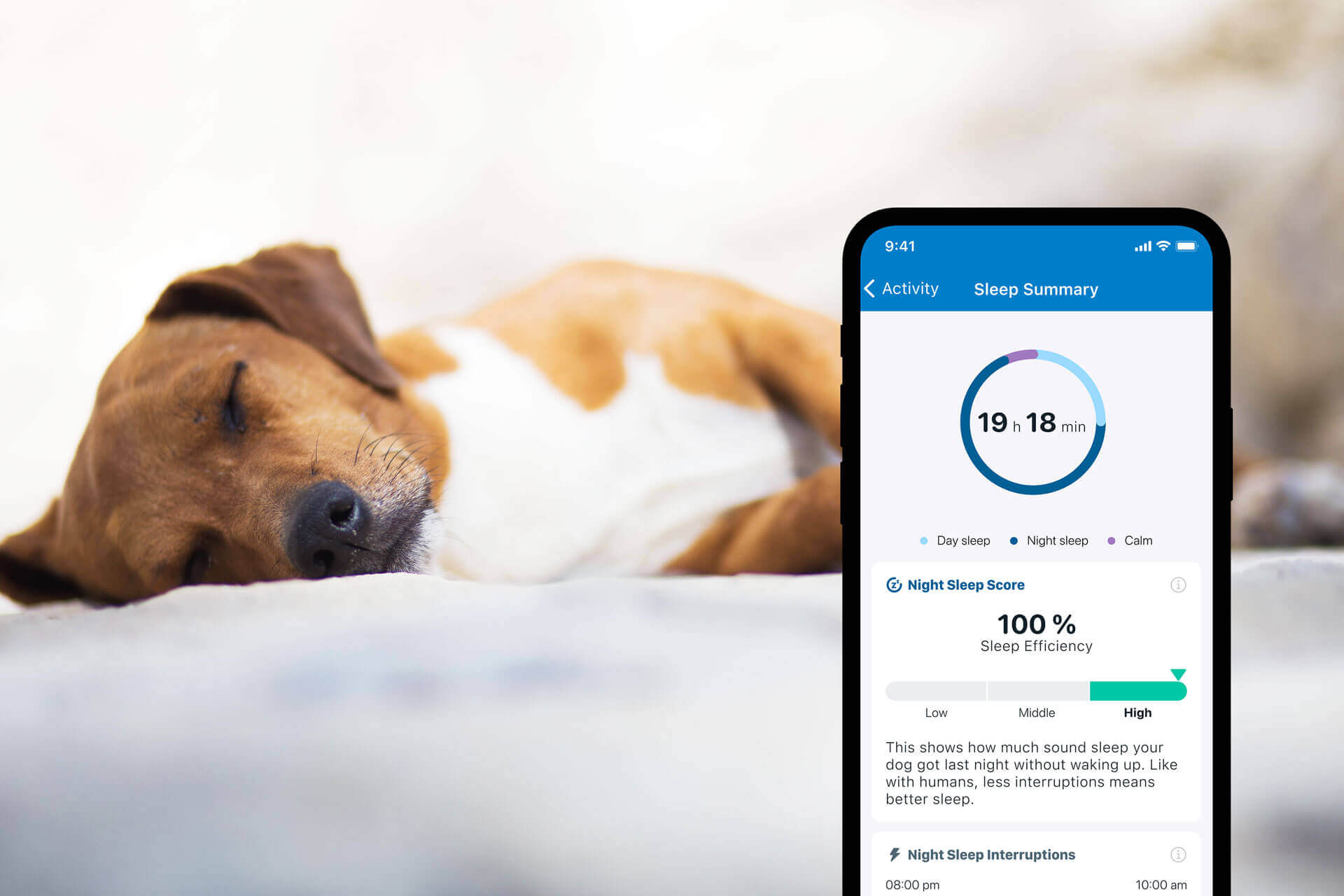
5) Take bathroom breaks before bed
Staying hydrated is important for your dog’s health, but not if midnight bathroom emergencies wake you up when the dog needs to go outside. Try managing your dog’s water intake during the day. Give your dog access to plenty of water all day, and offer extra water after an exercise session.
After your dog’s evening meal and accompanying slurp of water, cut back on the amount of water available to your pup. Leave a small amount of water in your dog’s water dish overnight. That way, they’ll be able to get a few sips if they awaken, but not drink an entire bowl.
It seems obvious, but remember to let your dog out to do their business right before you go to bed. Do not turn this into a play session. Make sure your dog actually urinates during this last-chance potty break. Puppies require a few months to be housebroken and potty trained before they’ll develop the habit of urinating (and not playing) when let outside.
6) Turn off all of the lights
A quiet, dark space is the key to creating a calming environment for sleep. Close the blinds or curtains, and turn off all the lights. If you like to go to sleep with the television on and your dog is in the same room with you, set your TV to turn off after a certain time period.
If there’s still a bit of light outside when you and your pup turn in for the night in the summer, for example, consider getting blackout curtains. These light-blocking curtains can clip onto your existing drapes to make the room extra dark and cozy. Plug in a small night light so you don’t stub your toe if you need to get up in the dark.
7) Use a calming supplement
For some dogs, especially those experiencing anxiety or general restlessness, calming supplements can be a helpful addition to their nighttime routine. These products often contain natural ingredients known for their sedative properties. With these, your dog can relax more easily – and sleep better as a result. Examples include melatonin, L-theanine, chamomile, and alpha-casozepine. However, do make sure to check with your vet before introducing any new supplements to your dog’s diet. They can best advise you on the appropriate dosage and how they may potentially interact with other medications.
In other cases, a ThunderShirt or pressure vest can also help your dog relax. (Similar to the way you might swaddle a baby.) Else, your vet can also advise you whether anti-anxiety medication might be a good fit for your dog.
A helpful bedtime routine for dogs
Most dogs do better with a routine than a sporadic sleep schedule. In other words, you want your pup to go to bed when you do, and wake up when you rise in the morning. So you could start with:
- Playtime
When everyone’s back home, designate someone to engage the dog in a vigorous play session to burn off the energy your pup built up during the day. - Mealtimes
Feed your dog dinner at about the same time as your family is eating. This will give your dog plenty of time to digest their meal before bedtime. - Post-meal walkies
After dinner, take your pup for as long a walk as you have time for. - Post-walk chillout time.
Let your dog relax after your walk. Enjoy some cuddle time or give your pooch a gentle massage. Start turning off lights and electronics in the house. - One last potty break
By this point in your evening routine, your dog should know that it’s almost time for sleep. Let them out for one last toilet break. - Chew toy
As they climb into their bed, offer a peanut butter-coated chew toy. - Turn out the lights
Close the curtains, turn on some calming music or white noise, and darken the room as you leave. - Finally, hop into bed for your own well-deserved rest at the end of a busy day.
Where a smart dog tracker can help
Now if you’ve followed all these steps and they’re still waking up, it could be a red flag. A sick dog could seem completely normal, happy, or even healthy, while still struggling with pain, discomfort, or an infection. Meaning, it’s easy to miss out on changes in their sleep habits – often until it’s too late. That’s where a smart tracker for dogs with Health Monitoring (including for their sleep) can help.
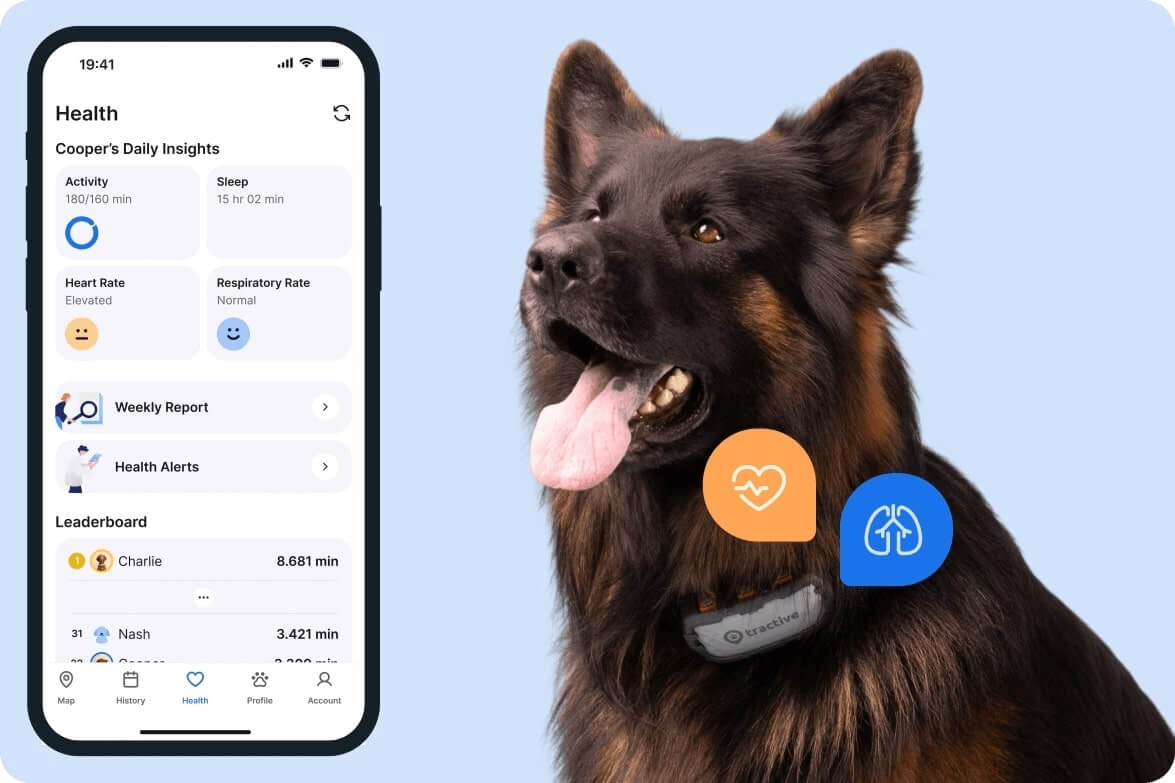
Strapped to your dog’s collar, your trusty Tractive device logs in your dog’s movements throughout the day (and night) as “active” and “sleep” minutes. Which, with time, can help you figure out:
- How much your dog tends to sleep throughout the day (when you’re not around)
- If there’s a weird change in your dog’s sleep quality – which could signal something’s wrong. In this case, you’ll get a Health Alert warning you.
- And even a change in your dog’s vital signs – including their breathing and heart rate.
All of which can help you catch on to a health issue early, avoid a medical emergency, and potentially save your buddy’s life, while at it.
Your furry friend’s health and wellbeing means as much as to us as it does to you. So we’ve made it a priority to only share medically-relevant content on our blog. This post was checked, double-checked, and medically verified by Georgia-based vet, Dr. Dwight Alleyne.

Dr. Dwight Alleyne, DVM
Originally from Long Island, New York, Dr. Alleyne began his career at a no-kill animal shelter before becoming a licensed veterinary technician. He graduated from Cornell University Veterinary College in 2006 and completed an internship at Purdue University. Now practicing in Georgia, Dr. Alleyne specializes in soft tissue surgery and ultrasounds. He also writes pet health articles on his website, “The Animal Doctor Blog” (www.anmldrblog.com).
